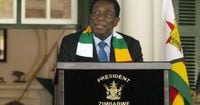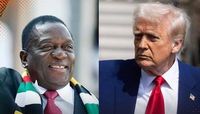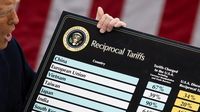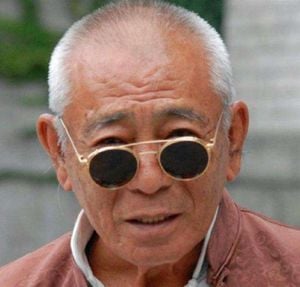Zimbabwe’s President Emmerson Mnangagwa made a significant announcement on Saturday, April 5, 2025, stating that he will suspend all tariffs on goods imported from the United States. This decision comes on the heels of U.S. President Donald Trump imposing an 18% tariff on Zimbabwean exports to the U.S., marking a pivotal moment in the diplomatic and trade relations between the two nations.
In a statement posted on the social media platform X, Mnangagwa described the tariff suspension as an effort to build a "mutually beneficial and positive relationship" with the Trump administration. He emphasized that the move is intended to encourage greater inflow of American products into Zimbabwe while simultaneously boosting the potential for Zimbabwean exports to the U.S.
"This measure is intended to facilitate the expansion of American imports within the Zimbabwean market, while promoting the growth of Zimbabwean exports destined for the United States," Mnangagwa stated, highlighting his administration's commitment to fostering amicable relations with all nations.
Despite the optimistic tone of Mnangagwa's announcement, the reality of trade between Zimbabwe and the U.S. remains modest. According to U.S. government data, bilateral trade amounted to just $111.6 million in 2024. American exports to Zimbabwe stood at $43.8 million—an increase of 10.6% from the previous year—while Zimbabwean exports to the U.S. saw a sharp decline of 41%, falling to $67.8 million.
This backdrop of limited trade raises questions about the potential benefits of Mnangagwa's decision. Harare-based political analyst Tendai Mbanje expressed skepticism, suggesting that the move may primarily benefit U.S. businesses rather than the Zimbabwean economy. Mbanje noted that the tariff suspension might not yield significant economic advantages for Zimbabwe.
Prominent investigative journalist and government critic Hopewell Chin’ono echoed these sentiments, questioning Mnangagwa’s motives. Chin’ono suggested that the president might be attempting to curry favor with the Trump administration in hopes of securing the removal of sanctions imposed on Zimbabwe over the years. "It’s a long shot," Chin’ono wrote on X, casting doubt on the likelihood of any immediate diplomatic reward.
Zimbabwe's diplomatic relations with the U.S. have been strained for over two decades, largely due to controversial land reform policies and a poor human rights record. The latest gesture from Mnangagwa signals an attempt to thaw the long-standing frostiness between Harare and Washington, yet critics argue that this move may have more symbolic value than practical impact.
As Zimbabwe grapples with ongoing economic challenges, the tariff suspension could be perceived as a strategic maneuver to reposition the country on the international stage. Mnangagwa's administration appears determined to take proactive steps in fostering trade relations, even if it means making the first move.
Meanwhile, the broader global context of trade relations is also shifting. World leaders are scrambling to find effective strategies to counter the reciprocal tariffs announced by President Trump. Some countries, like Vietnam, are seeking to delay the imposition of tariffs, while others are exploring ways to drop levies on American goods.
Trump's sweeping tariffs, announced on April 2, 2025, range from 10% to 50% on imports from dozens of countries, including Zimbabwe. The initial 10% baseline tariff took effect on April 5, 2025, at U.S. seaports and customs warehouses. This aggressive tariff policy has raised concerns about a potential escalation in global trade tensions, impacting consumers worldwide.
In the wake of these developments, some nations are opting to avoid direct retaliation against U.S. tariffs. For instance, India has ruled out counter tariffs in response to Trump's 26% tariff on imports from the Asian nation, citing ongoing negotiations for a trade deal. This approach reflects a broader strategy among certain countries to engage in dialogue rather than escalate trade disputes.
As global markets react to the shifting trade landscape, analysts and experts are divided on the best course of action—whether to negotiate or retaliate. The implications of Trump's tariffs extend beyond Zimbabwe, affecting economies worldwide, including key U.S. allies.
In this complex environment, Mnangagwa's announcement of tariff suspension stands out as a bold move aimed at revitalizing Zimbabwe's trade relations with the U.S. However, as the country navigates its economic challenges, the effectiveness of this decision remains to be seen.
Ultimately, while the suspension of tariffs may open doors for American imports into Zimbabwe, the question of whether it will significantly bolster Zimbabwean exports to the U.S. looms large. With critics warning that the gesture may be more symbolic than substantive, the international community will be watching closely to see how this diplomatic overture unfolds.







